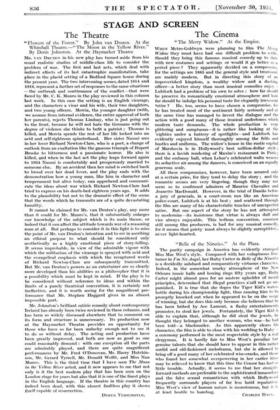The Cinema
"The Merry Widow." At the Empire.
WHEN Metro-Goldwyn were planning to film The Merry Widow they must have had one difficult problem to settle. Should they bring this famous musical comedy up to date with new costumes and settings or would it go better as a period piece Y They apparently decided on a compminise, for the settings are 1885 and the general style and treatment are mainly modern. But in directing this story of an impoverished kingdom, a wealthy widow and a dashing officer—a better story than most musical comedies enjoy- Lubitsch had a problem of his own to solve : how far should he preserve its romantically emotional atmosphere and how far should he indulge his personal taste for elegantly irreverent satire ? He, too, seems to have chosen a compromise, for he has treated most of the sentiment fairly seriously and at the same time has managed to invest the dialogue and the action with a good many of those ironical undertones which modern taste demands. The whole production is very glittering and sumptuous—it is rather like looking at the 'eighties under a battery of spotlights—and Lubitsch has evidently enjoyed himself thoroughly among the frills and bustles and uniforms. The widow's house in the rustic capital of Marshovia is in Hollywood's best million-dollar style ; there is a lavish rendering of Maxim's restaurant in Paris ; and the embassy ball, when Lehar's celebrated waltz weaves its seductive air among the dancers, is conceived on an equally generous scale.
All these compromises, however, have been secured only at a certain price, for they tend to delay the story ; and the romantic scenes are very lingering, though they may not seem so to confirmed admirers of Maurice Chevalier and Jeanette MacDonald. However, in the trial of Danilo before a jury of generals, in a court-room run like an American police-court, Lubitsch is at his best ; and scattered through the film are many of his characteristic touches of unexpected satire. But one aspect of the story he has not attempted to modernize—its insistence that virtue is always dull and vice always enjoyable. This tedious convention, common still among film producers, is bad for any musical comedy, for it means that gaiety must always be slightly surreptitiou-, never light-hearted.










































 Previous page
Previous page